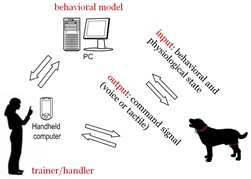Bozkurt Receives Research Award from NSF for Cyber-Physical Systems
Alper Bozkurt along with his collaborators (David Roberts from Computer Science and Barbara Sherman from College of Veterinary Medicine), have been awarded $999,103 by the National Science Foundation Cyber-Physical Systems (NSF-CPS) Program for their research on “CPS: Synergy: Integrated Sensing and Control Algorithms for Computer-Assisted Training”.
September 12, 2013 ![]() NC State ECE
NC State ECE
Alper Bozkurt, Assistant Professor of Electrical and Computer Engineering, along with his collaborators (David Roberts from Computer Science and Barbara Sherman from College of Veterinary Medicine), has been awarded $999,103 by the National Science Foundation Cyber-Physical Systems (NSF-CPS) Program for their research on “CPS: Synergy: Integrated Sensing and Control Algorithms for Computer-Assisted Training”. The award will run from October 1st, 2013 to September 30th, 2016. Alper Bozkurt had also received an award from NSF-CPS Program last year for his project titled “CPS: Synergy: Collaborative Research: Cyborg Insect Networks for Exploration and Mapping (CINEMa)”.
Abstract:
This project will result in fundamental physical and algorithmic building blocks of a novel cyber-physical for a two-way communication platform between handlers and working dogs designed to enable accurate training and control in open environments (eg, disaster response, emergency medical intervention).
Miniaturized sensor packages will be developed to enable non- or minimally-invasive monitoring of dogs’ positions and physiology. Activity recognition algorithms will be developed to blend data from multiple sensors. The algorithms will dynamically determine position and behavior from time series of inertial and physiological measurements. Using contextual information about task performance, the algorithms will provide duty-cycling information to reduce sensor power consumption while increasing sensing specificity. The resulting technologies will be a platform for implementation of communication.
Strong interactions among computer science, electrical engineering, and veterinary science support this project. Work at the interface between electrical engineering and computer science will enable increased power efficiency and specificity of sensing in the detectors; work at the interface of electrical engineering and veterinary behavior will enable novel physiological sensing packages to be developed which measure behavioral signals in real time; Project outcomes will enable significant advances in how humans interact with both cyber and physical agents, including getting clearer pictures of behavior through real time physiological monitoring.
Students are part of the project and multidisciplinary training will help to provide development of the Cyber-Physical Systems pipeline. Project outreach efforts will include working with middle school children, especially women and under-represented minorities, presentations in public museums that will promote public engagement and appreciation of the contribution of cyber-physical systems to daily lives. The goal of each outreach activity is to encourage both interest and excitement for STEM topics, demonstrating how computer science and engineering can lead to effective and engaging cyber-physical systems.


